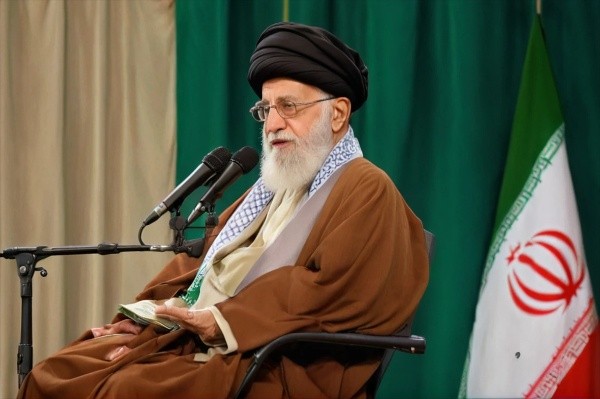Iran’s Plan to Strike Back Against the U.S.
Iran’s Military Preparations Following U.S. Attacks
Loading...

The supreme leader had struck a more cautious approach in earlier remarks after Israeli air strikes on Iran last week.
A Call for Retaliation
In a significant escalation of rhetoric, Iranian Supreme Leader Ayatollah Ali Khamenei has issued a stern warning to both Israel and the United States, promising a “crushing response” to their actions against Iran and its allies. This declaration was made during a speech on Saturday, coinciding with the anniversary of the 1979 takeover of the US embassy in Tehran, an event that solidified the long-standing animosity between Iran and the US.
Khamenei, addressing a gathering of students in Tehran, emphasized that the “enemies,” referring specifically to the “Zionist regime” and the United States, would face severe consequences for their actions against Iran and the broader resistance front, which includes groups like Hezbollah, Hamas, and the Houthis in Yemen. He did not specify when or how Iran might retaliate, leaving the timing and scope of any potential response ambiguous.
Context of the Tensions
The backdrop to Khamenei's remarks includes recent Israeli airstrikes on Iranian military sites, which occurred on October 26. These strikes were reportedly in retaliation for a significant missile attack launched by Iran on October 1, which involved approximately 200 missiles targeting Israel. The Iranian missile barrage was a response to previous Israeli operations that had resulted in the deaths of key figures within Hezbollah, Hamas, and the Iranian military.
Khamenei's earlier comments had taken a more measured tone, suggesting that Iranian officials would carefully consider their response to the Israeli attacks. He had previously stated that the situation should not be “exaggerated nor downplayed,” indicating a cautious approach to the escalating conflict.
Rising Risks of Escalation
The ongoing hostilities pose a significant risk of further escalation in the region, which is already tense due to Israel's military actions in Gaza and Lebanon. Israeli military chief Lieutenant General Herzi Halevi warned that if Iran were to launch another missile attack, Israel would respond decisively, indicating that specific targets had been identified for potential strikes.
The situation is further complicated by the presence of US military forces in the region. In response to the rising tensions, US Defense Secretary Lloyd Austin has ordered the deployment of additional military assets, including ballistic missile defense systems and long-range strike bombers, to bolster defenses against potential Iranian aggression. Austin has made it clear that the US will take all necessary measures to protect its personnel and interests in the Middle East.
A Divided Response
As Khamenei addressed the enthusiastic crowd of university students, who chanted their support, the Iranian leadership faces a complex decision-making process. While there is a strong desire to demonstrate Iran's military capabilities and resolve, there is also the recognition of the risks associated with a direct confrontation with Israel and the US. The Iranian leadership must balance the need to respond to perceived threats while avoiding a full-scale war that could have devastating consequences for the region.
In conclusion, Khamenei's warning reflects the heightened tensions between Iran, Israel, and the US, with the potential for further military confrontations looming. As both sides prepare for possible escalation, the international community watches closely, aware that any miscalculation could lead to a broader conflict in an already volatile region.
Editor
Iran’s Military Preparations Following U.S. Attacks
Troops remain in five strategic locations, raising fears of renewed tensions and long-term occupation.
Opposition forces have taken control of the capital after a significant offensive. Here is how it unravelled.
